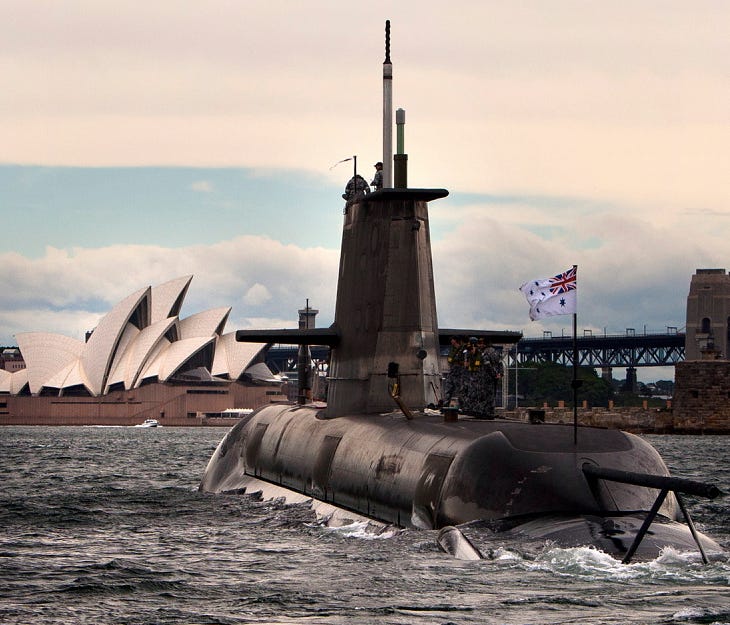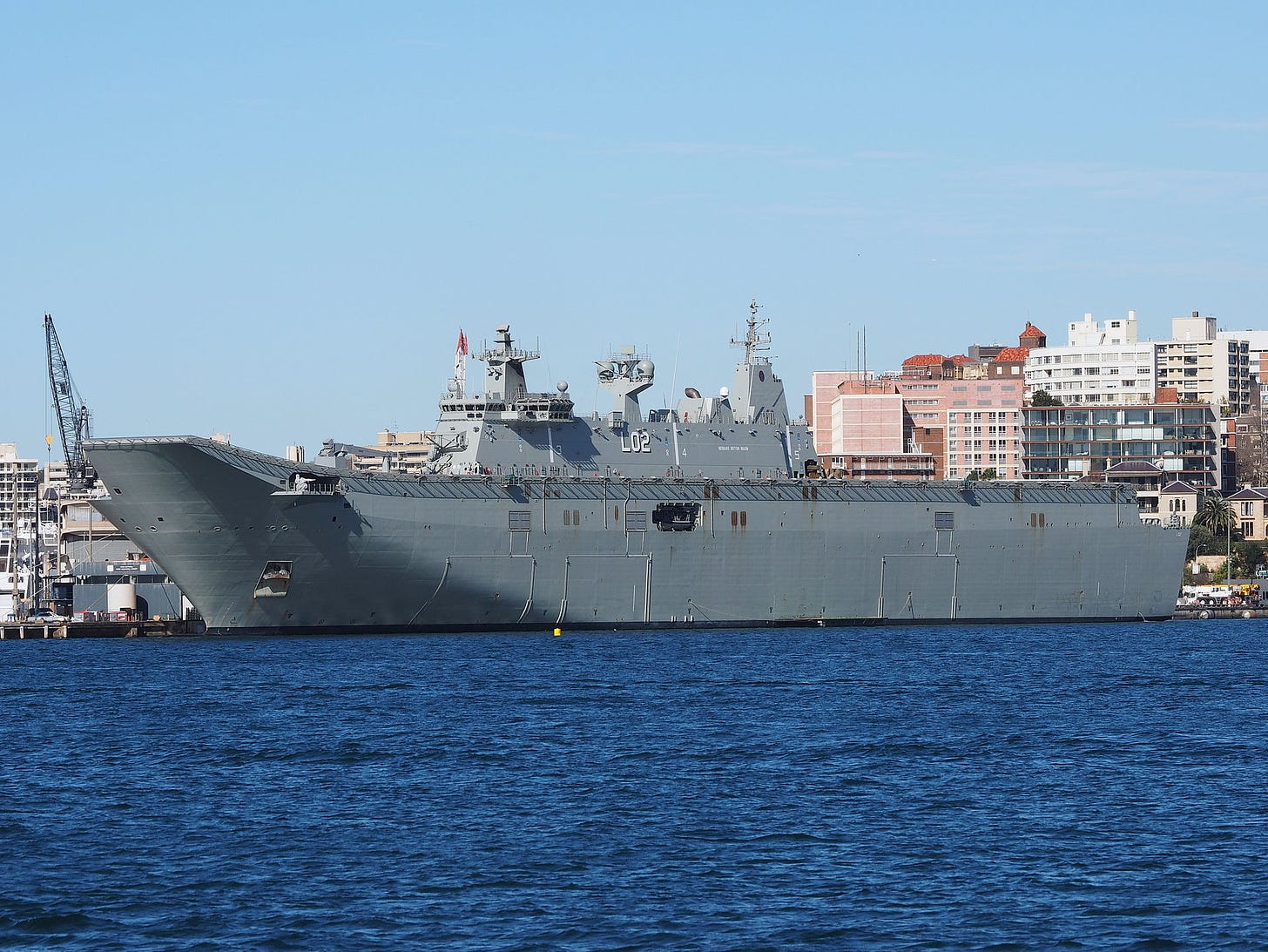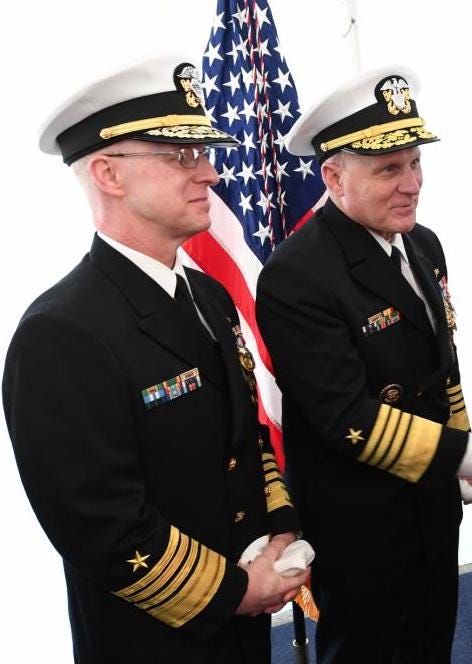House goes to war with Senate over subs for Australia!
The other thing about congress is they love money, doubly so if its tax free
Washington DC 12 Jan 2023
“The first, the supreme, the most far-reaching act of judgment” that the congressman has to make is to establish more funds for their district, state or country.
SHOTS FIRED!
In heartbreaking news for mariners everywhere, Clausewitz wrote in a pre-submarine epoch. But he knew a thing or two about people, states, politics and war.1 He correctly observed that war is “the use of force to compel our enemy to do our will”. War remains a political activity where force is substituted for words. Put another way, pre-war politics is “the use of persuasion to compel our opponent to agree to our proposition”.
Anyone who has worked in Congress and/or the Pentagon2 knows the hardest battles are fought within the walls of the institution. In Congress, red v blue and House v Senate. In the Pentagon, the bellum primus inter pares, is inter service football aka the ‘Rice Bowl’. The next hardest battles are between these institutions.
This week, Thirdoffset has commented on several battles that have broken out over the AUKUS treaty that shares cutting edge US military technology with Australia. The first shot was fired by the bipartisan leadership of the Senate Armed Services Committee, torpedoing Australia’s desire to purchase off the shelf Virginia class SSNs.
Caught unaware by this surprise attack, Canberra returned fire saying they would build SSNs themselves while constantly dropping “the UK” into their statements. As was noted in yesterday’s Thirdoffset’s battlefield report, the manufacturer of the British Astute class SSN, BAE systems, already has a substantial naval construction footprint in Australia, successfully delivering several classes of ships, including Air Warfare Destroyers and the Canberra class LHDs.
Not to be outgunned, today the House Armed Services Committee broadsided the honorable gentlemen of the other chamber for the highest crime imaginable - squandering billions of dollars of that sweet, sweet, foreign moolah that might end up in their districts. Accordingly, they wanted to have their American cake and eat the Aussie icing too. Screw BAE! Or as they delicately put it, they wanted to “leverage resources possible under AUKUS”.
The letter, a bipartisan effort (remarkable in itself these days) actually makes a compelling case for taking the long view (thats usually a senate not a house thing).
“There is no doubt that our domestic submarine industrial base… has been strained. However, this need not be a static picture in the coming decades over which AUKUS will be carried out,” the letter continues.
They argue that with a focused effort now (trans: more moolah), there is no reason why both US and Australian needs cannot be met in the relevant timeframe. Step one: “expansion of our industrial base”. Their preference is for a hybrid program that includes “early provisioning of existing Virginia class submarines” and a joint manufacturing program that in time will result in “Australia’s ability to domestically produce nuclear-powered submarines”.3
This is a bit too heavy on having everything and giving up nothing. But given the time lines and stable planning a win-win should be possible. Now we can all move on with out lives….
TORPEDOES AWAY!
Wait! There is angry black smoke belching across the far horizon. Steaming into view come the US Navy’s biggest brass hats. They are not the least bit happy. At least one of them is giving defaulters in industry (and by association, their financiers in congress) an uncharacteristically harsh lashing of the cat.
Recall that, as Navy Times put it, “the Navy is buying two submarines a year, but industry is only delivering at a rate of 1.2 a year.”
The old saw is there is noting more dangerous than an O-6 about to retire.4 Turns out there is something much worse: an O-10 who has burnt all bridges on the pathyway towards a retirment boardroom. Adm. Daryl Caudle, the commander of U.S. Fleet Forces Command, chided the defaulters
“I’m not as forgiving of the defense industrial base. I’m just not... All this stuff about COVID this, parts, supply chain this, I just don’t really care.” Admiral Caudle said on Jan 11.5
“In five years, instead of delivering 10 fast attack submarines, I got six. Where’s the other four? My force is already four submarines short,” Caudle said. Ships coming out of maintenance availabilities late, both at Navy public yards and private industry yards, worsens the problem. “While the Navy should have 10 of its 50 subs in deep maintenance, 19 are in or awaiting repairs. Imagine if I was on time, my submarine force would be nine ships larger.” he said.
The fact is, he is right. His frustrations are understandable and his speaking truth to the military-industrial-complex, is as commendable as it is rare, due to the all powerful revolving door.
The military is in a vice. One of the jaws is supply chain delays. This has exposed the excessive fragility of ‘just in time’ supply and logistics. The lesson - you have to maintain significant redundancy (aka war stocks) regardless of cost. This is not WWII. There is no mass industry, civilian or defense, to transition to mass production of major platforms and munitions. For illustration, JDAMs are made in a room no bigger than 2 tennis courts.6
The other jaw in the vice is massive growth in demand. The war in Ukraine has been a potent arms bazaar showroom. All of America’s allies have submitted long shopping lists of their new favorite weapons and sensors "as seen on tv". In most cases, this is in response to their threat horizon suddenly changing thanks to Russia (and the growing threat of China).
Of deeper concern, the consumption rates of munitions seems to have taken US planners by surprise.7 It is so bad that US war stocks shipped to Ukraine have left the US with major gaps that will take years to plug, before additional sales to allies can be filled. Funding is being relesed to ramp up production, but industry cannot service demand, ironically because it is so "efficient". Prior to Ukraine, industry was busy satisfying shareholders with peacetime cost reduction necessities of 'lean production' and 'just in time'. This is further complicated by the fact that the high level of technical skill for these jobs was already upside down before the surging requirements hit.
All of these factors, and others besides, have lead American military leaders to now openly admit that the paradigm of two simultaneous major regional contingencies (MRCs) is already beyond the scope of American capabilities.
Adm. Mike Gilday, the Chief of Naval Operations (CNO), said during a hearing of the Senate Armed Services Committee the USN
“is not sized to handle two simultaneous conflicts, it’s sized to fight one and keep a second adversary in check, but in terms of two all-out conflicts, we are not sized for that.”
The navy is struggling to have 75 ships at sea or ready to go. The CNO speaking with Admiral Caudle has stressed these issues are at the core of his top priorities.
“I’m trying to put U.S. production lines at their maximum level right now and to try and maintain that set of headlights in subsequent budgets, so that we continue to produce those weapons. That’s one thing we’ve seen in Ukraine, that the expenditure of those high-end weapons in conflict could be higher than we estimated,” CNO Admiral Gilday said.
We have seen the enemy and the enemy is congress
Here we come full circle back to congress. The navy cannot plan and sustain a stable ship or submarine production schedule if congress cant pass a budget. Congress has not passed a budget in years. Like a drug addict, it sits in a corner scratching its arm waiting for continuing resolutions. The institution is malfunctioning and there is no hope in sight that anything will change. On the contrary, there is plenty of evidence that things will get much worse.
A small group of extremists in the House will vacate the speakership just before the debt ceiling increase debate. They will force a default and a global economic calamity. This will weaken America in much more powerful ways than just the impact on defense planning, ship building programs, and alliance management priorities. However, these considerations are a good snapshot to illustrate the dangers of these extremists playing Russian roulette with a fully load revolver.
In the war on subs for Australia, the House response to the Senate is pleasantly refreshing. As previously argued on Thirdoffset, creative solutions should be found for strategic and alliance reasons because this is such an obvious win-win. Readers will know Thirdoffset is skeptical of the time and resources needed to get the Australian industrial base making SSNs vice the simplicity of off the shelf purchases. However, the HASC makes a good case for a phased program of mutual sub operations and mutual production programs, with Australia learning from the US and gradually coming on line to supplement US ships yards. With no peace dividend on the long term horizon, and only war to be deterred by robust allied undersea warfare capabilities ready to box in the PLA, the investment in an Australian SSN capability, if done right, would be wise.
It would also position Australia to transition to its own nuclear deterrent. This eventual inevitability, has previously been discussed in multiple assessments by Thirdoffset that judged South Korea and even anti-nuclear Japan would eventually be forced down this pathway. Yesterday the government in Seoul announced that it is ready to acquire nuclear weapons. But that is a story for another day.
Update - 19 Jan 2023 SSBN delivery date slips
Not a good sign re US industry capability. This has been long anticipated. Story:
US Navy’s Newest Submarine Leaves Pentagon Baffled on When It Will Be Ready
The actual full quote is as follows but I could not stretch to “statesman” in stealing the idea from the dead German.
"The first, the supreme, the most far-reaching act of judgment that the statesman and commander have to make is to establish . . . the kind of war on which they are embarking." Carl von Clausewitz
Thirdoffset has done both and has the honor of being able to add working in the Australian parliament and pentagon equivalent (R1).
“While it is essential to maintain a minimum of two submarines a year for the United States to meet our national security requirements, we are supportive of expanding the industrial base to meet AUKUS expectations. We particularly believe that an expansion of our industrial base beyond two submarines would support the early provisioning of existing Virginia class submarines to be made available concurrent with the retirement of the Collins class attack submarines,” the authors said in the letter.
“These realities should not be viewed as a reason not to pursue US build submarine options in AUKUS but rather as a unique opportunity to leverage the support and resources possible under AUKUS to grow our industrial base to support both US and Australian submarine construction, recognizing that the full fruition of AUKUS over many decades will result in Australia’s ability to domestically produce nuclear-powered submarines,” they said. “This could create a strong and long-term demand signal that this and successive administrations, the Navy and industry can prepare for, should that be the outcome of this process.”
The idea being they are finally free to speak their minds. After a career of hewing to the following unwritten rules of bureaucracy they are a ticking time bomb.
(1) Insist on doing everything through "channels." Never permit short-cuts to be taken in order to expedite decisions.
(2) Make "speeches." Talk as frequently as possible and at great length.
(3) When possible, refer all matters to committees, for "further study and consideration." Attempt to make the committees as large as possible-never less than five.
(4) Bring up irrelevant issues as frequently as possible.
(5) Haggle over precise wordings of communications, minutes, resolutions.
(6) Refer back to matters decided upon at the last meeting and attempt to re-open the question of the advisability of that decision.
(7) Demand written orders.
(8) "Misunderstand" orders. Ask endless questions or engage in long correspondence about such orders. Quibble over them when you can.
(9) Do everything possible to delay the delivery of orders. Even though parts of an order may be ready beforehand, don't deliver it until it is completely ready.
(10) In making work assignments, always sign out the unimportant jobs first.
(11) Insist on perfect work in relatively unimportant products; send back for refinishing those which have the least flaw. Approve other defective parts whose flaws are not visible to the naked eye.
(12) When training new workers, give incomplete or misleading instructions.
(13) To lower morale and with it, production, be pleasant to inefficient workers; give them undeserved promotions. Discriminate against efficient workers: complain unjustly about their work.
(14) Hold conferences when there is more critical work to be done.
(15) Multiply paper work in plausible ways.
(16) Start duplicate files.
(17) Multiply the procedures and clearances involved in issuing instructions, pay checks, and so on. See that three people have to approve everything where one would do.
(18) Apply all regulations to the last letter.
(19) Do your work poorly and blame it on bad tools, machinery, or equipment. Complain that these things are preventing you from doing your job right.
(20) Never pass on your skill and experience to a new or less skillful worker.
(21) Snarl up administration in every possible way. Fill out forms illegibly so that they will have to be done over; make mistakes or omit requested information in forms.
(22) Give lengthy and incomprehensible explanations when questioned.
(23) Act stupid.
(24) Be as irritable and quarrelsome as possible without getting yourself into trouble.
(25) Misunderstand all sorts of regulations concerning such matters as rationing, transportation, traffic regulations.
From the OSS guide to Sabotage.
The position of his hands during this statement was not reported.
At least when Thirdoffset visited many years ago.
This is deeply disturbing. It shows how poor planning has been.






